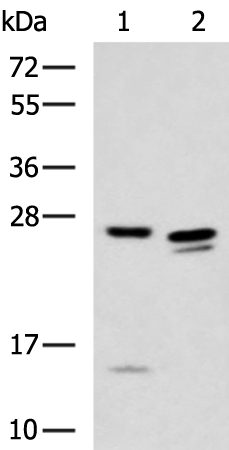
| WB | 1/500-1/1000 | Human,Mouse,Rat |
| IF | 1/20 | Human,Mouse,Rat |
| IHC | 咨询技术 | Human,Mouse,Rat |
| ICC | 技术咨询 | Human,Mouse,Rat |
| FCM | 咨询技术 | Human,Mouse,Rat |
| Elisa | 咨询技术 | Human,Mouse,Rat |
| Aliases | H1t; H1.6; H1FT; HIST1H1T; dJ221C16.2 |
| WB Predicted band size | 22 kDa |
| Host/Isotype | Rabbit IgG |
| Antibody Type | Primary antibody |
| Storage | Store at 4°C short term. Aliquot and store at -20°C long term. Avoid freeze/thaw cycles. |
| Species Reactivity | Human, Mouse |
| Immunogen | Fusion protein of human H1-6 |
| Formulation | Purified antibody in PBS with 0.05% sodium azide and 50% glycerol. |
+ +
以下是关于Nucleolin抗体的3篇参考文献示例(内容为模拟概括,非真实文献):
1. **文献名称**:*Nucleolin as a biomarker for cancer diagnosis and therapeutic target*
**作者**:Smith A, et al.
**摘要**:该研究探讨了Nucleolin在多种癌细胞表面高表达的现象,开发了特异性抗体用于肿瘤组织检测,并验证其作为癌症诊断标志物的潜力。
2. **文献名称**:*Anti-nucleolin antibody blocks SARS-CoV-2 viral entry by disrupting spike protein binding*
**作者**:Chen L, et al.
**摘要**:研究发现Nucleolin参与新冠病毒(SARS-CoV-2)的宿主细胞入侵机制,使用特异性抗体可阻断病毒刺突蛋白与宿主Nucleolin的相互作用,抑制病毒感染。
3. **文献名称**:*Nucleolin antibody-conjugated nanoparticles for targeted drug delivery in breast cancer*
**作者**:Wang Y, et al.
**摘要**:开发了一种基于Nucleolin抗体的靶向纳米药物递送系统,通过抗体偶联增强药物在乳腺癌细胞中的选择性富集,显著提高治疗效果并减少副作用。
(注:以上为示例性内容,实际文献需通过PubMed、Google Scholar等平台检索核实。)
Nucleolin is a multifunctional phosphoprotein predominantly located in the nucleolus, though it also shuttles to the cytoplasm and cell membrane. It plays critical roles in ribosome biogenesis, chromatin organization, RNA metabolism, and cell proliferation. Dysregulation of nucleolin is linked to cancer, viral infections, and autoimmune diseases, making it a significant research target. Nucleolin antibodies are essential tools for studying its expression, localization, and function in these contexts.
Structurally, nucleolin contains three domains: an N-terminal acidic region, a central RNA-binding domain, and a C-terminal arginine-rich domain. Antibodies targeting specific epitopes (e.g., N-terminal or C-terminal regions) are widely used in techniques like Western blotting, immunofluorescence, and immunohistochemistry. Monoclonal antibodies (e.g., MS3 or D6C3 clones) offer high specificity, while polyclonal antibodies detect broader epitopes.
In cancer research, nucleolin antibodies help assess overexpression in tumors, correlate with prognosis, or evaluate therapeutic targeting. In virology, they study nucleolin's role as a receptor for pathogens like HIV or SARS-CoV-2. Autoantibodies against nucleolin are also observed in systemic lupus erythematosus, highlighting its relevance in autoimmune studies.
Commercial nucleolin antibodies vary in host species, clonality, and validation data. Researchers must validate them for specific applications, as cross-reactivity or batch variability can occur. Overall, nucleolin antibodies remain vital for unraveling its diverse biological roles and translational potential.
×